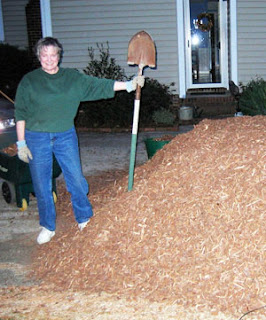Building and maintaining a compost pile is the easiest and most surefire way to become a better gardener. Compost will improve your soil structure and will provide a balanced source of plant nutrients. Unlike commercial organic or inorganic fertilizers, which need to be applied at the right time and at the right amount, compost can be added to the soil at any time and in any amount. It's impossible to over-apply compost; plants will absorb only want they need, when they need it.
One of the best aspects of composting is that you cannot fail. Organic matter will rot no matter what, fuss with it everyday, or ignore it, for months - it doesn't matter.
Two types of materials make up a compost pile: Carbon, or "browns" and Nitrogen, or "greens". Carbon items are dried leaves, woody plant trimmings, dead garden and house plants, dried grass clippings, shredded paper products, straw and hay. Nitrogen items are raw fruit and vegetable scraps, coffee grounds, filters and tea bags, egg shells, fresh grass clippings, nut shells, stale or moldy bread, leafy plant trimmings, and spent flowers.
To build a pile, start with about 1 foot of "browns" add about 3 inches of greens, keep the materials as moist as a wrung-out sponge, repeat layering until the bin is full, ending with a layer of "browns". The closer you can get to 3 parts carbon to 1 part nitrogen, the faster you will have finished compost. Aerating the pile by turning and mixing the layers will speed the decomposition. It is recommended that you turn you pile after 1 week, then every 3 weeks for a total of 4 turns. You should have finished compost in about 3 months. The pile usually shrinks to ½, or less of its original size and will be dark, crumbly, and ready for your garden.
 About the author:
About the author:An avid gardener and master composter, Connie spends most of her spare time nurturing her garden. Currently, Connie serves on the Mecklenburg Waste Management Board. She is also Executive Director of Journey Toward Sustainability, a program with the mission of educating elementary school children in Char/Meck Schools on how they can make a difference by doing small things. Their goal is to begin a conversation with the next generation about what living in a sustainable world means. Connie has a Bachelor's degree in Elementary Education and a Master's degree in Educational Media.
Here, Connie spreads a large pile of pine mulch on her front yard, which is now entirely naturalized- not a single blade of grass!








No comments:
Post a Comment